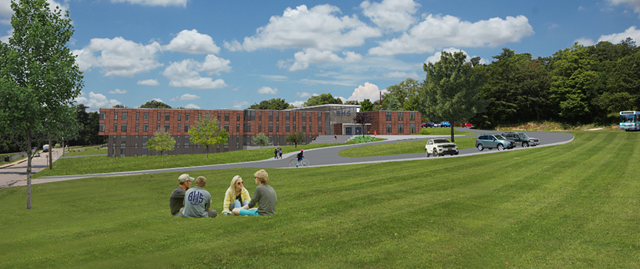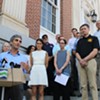click to enlarge 
- Courtesy of Burlington School District
- Rendering of the proposed renovation to Burlington High School
Burlington voters will decide in November whether to approve what would be a record amount of bonding for the city. The city council agreed Monday to put on the ballot a $70 million project to renovate Burlington High School and a separate $30 million wastewater infrastructure plan.
Councilors acknowledged the magnitude of the projects but backed them wholeheartedly, passing both measures with overwhelming support.
Councilor Dave Hartnett (D-North District) said voting on the high school made it "one of the best nights" for the council. But he acknowledged that the expense means "we're going to have to sacrifice."
Only Council President Kurt Wright (R-Ward 4) voted against the school renovation, which would create a three-story addition to Burlington High School and address long-standing accessibility issues. "I thought more public input was needed and would have been useful," Wright said.
When the initiative passed 11-1, the audience broke into applause.
The funding would have a significant impact on taxpayers. Under the city's proposed borrowing for these projects and others, a resident with a home valued at $250,000 would pay additional property taxes that would gradually increase to $550 a year by 2028. Currently, the average Burlingtonian pays $6,711 in property taxes.
Those projected tax increases include a bond for repairs to Memorial Auditorium, which is expected to be on the March ballot. That would cost the average homeowner $70 a year, according to city projections.
But it doesn't include the $30 million wastewater investment. That would cost the average family $64 a year, but would be part of water bills, not property taxes. That bond would cover upgrades to the city's three treatment plants, repairs to some pump stations, miles of new pipe and pollution prevention plans.
The council also approved a debt policy, which sets a limit on municipal and school borrowing.
The debt policy ceiling limits the amount that can be borrowed to figures that won't affect the city's credit rating. The policy allows the city and the schools to borrow $192 million in fiscal year 2019 in general obligation bonds, which includes the school and the Memorial Auditorium bonds, but not the wastewater funds.
The combined bonds, if approved, would bring the city close to the cap — within $4 million in 2024 — and could limit borrowing in the future. The city currently has $52 million in debt; the school is still paying off an additional $30 million.
But councilors praised the policy as a guideline for spending. Councilor Karen Paul (D-Ward 6) said it would serve as a "roadmap" for future borrowing. "It enhances the quality of the decisions we make," she said.
Mayor Miro Weinberger cautioned that a new debt policy won't automatically mean more borrowing. That would be left up to the voters, he pointed out.
"I hope people understand that after this, the decision is ultimately theirs," he said.
Correction, September 25, 2018: The projected tax impacts of the bonding would take place in gradual increments, as the story now notes. Also, a previous version of the story contained an erroneous figure about Memorial Auditorium's potential cost to taxpayers. Lastly, a sentence that inaccurately stated an assertion by Michael Gaughan about the relative size of the Burlington High School bond has been removed.
































































